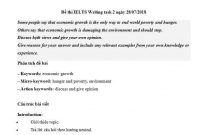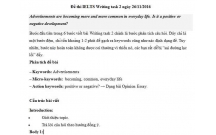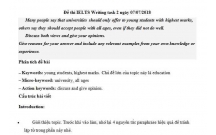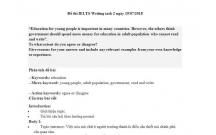
IELTS Writing task 2 - chủ đề chủ đề Population
Đ thi IELTS Writing task 2 ngày 02/11/2017ề
The aging population is good for business, the economy and society. Others disagree. Discuss
both views and give your opinion.
Phân tích đ bàiề
Đ có th lên dàn ý hoàn ch nh cho m t bài vi t, nh t thi t ph i tr i qua b c này. Lý do t i ể ể ỉ ộ ế ấ ế ả ả ướ ạ
sao ? Phân tích đ m c đích chính là đ xác đ nh t khóa, d ng bài cũng nh yêu c u đ bài. ư ề ụ ể ị ừ ạ ư ầ ề
N m đ c nh ng đi u đó thì chúng ta m i có th đi t i các b c ti p theo mà không b lúng ắ ượ ữ ề ớ ể ớ ướ ế ị
túng và nh m l n.ầ ẫ
– Keywords: aging population
– Micro-keywords: business, economy, society.
– Action keywords: Discuss both these views and give your own opinion
Nh v y, bài vi t thu c d ng bài Opinion Essay.ư ậ ế ộ ạ Cách vi t d ng Opinion Essayế ạ thì h n các ẳ
b n cũng khá rõ r i, chúng ta ch y u bày t đ c quan đi m c a mình và nh n xét v n đ . ạ ồ ủ ế ỏ ượ ể ủ ậ ấ ề
Trong bài này, cô đã s d ng đ i t nhân x ng ngôi th nh t đ nêu quan đi m b n thânử ụ ạ ừ ư ứ ấ ể ể ả m t ộ
cách tho i mái và t nhiên mà không b quá khô c ng, gò bó, t o c m giác gi ng 1 bài nghiên ả ự ị ứ ạ ả ố
c u hay chính lu n.ứ ậ
C u trúc bài vi tấ ế
Sau khi hoàn thành b c phân tích đ – b c đ u tiên trongướ ề ướ ầ các b c vi t bàiướ ế , chúng ta
chuy n sang l p dàn ý ngay nhé. H n ch b c này trong 6-7 phút đ cân đ i th i gian.ể ậ ạ ế ướ ể ố ờ
Introduction:
Gi i thi u topic b ng cách paraphrase l i đ u bài.ớ ệ ằ ạ ầ
Kh ng đ nh ý ki n b n thân theo h ngẳ ị ế ả ướ
Body 1:
Topic sentence: M t s quan đi m l c quan cho r ng dân s già có l i ích.ộ ố ể ạ ằ ố ợ
Supporting idea 1: Ng i l n tu i thì kinh nghi m dày d n, ki n th c sâu r ng có th ườ ớ ổ ệ ặ ế ứ ộ ể
tr thành các nhà t v n l i l c trong doanh nghi p.ở ư ấ ỗ ạ ệ
Supporting idea 2: Có th giúp đ ng i tr trong các công vi c khác nh trông con, ể ỡ ườ ẻ ệ ư
quán xuy n vi c nhà.ế ệ
Body 2:
Topic sentence: M t khác, dân s già cũng có nhi u b t l i.ặ ố ề ấ ợ
Supporting idea 1: Dân s già khi n ng i tr ph i g ng gánh nhi u trách nhi m h n.ố ế ườ ẻ ả ồ ề ệ ơ
Supporting idea 2: Nhi u ti n công c n s d ng đ chi tr cho phúc l i xã h i, h u ề ề ầ ử ụ ể ả ợ ộ ư
trí..
Conclusion: T ng k t và tr l i l i câu h i, paraphrase l i ý ki n đã nêu m bài.ổ ế ả ờ ạ ỏ ạ ế ở ở
Gi i đ thi IELTS Writing task 2 ngày 02/11/2017ả ề
Bài m u tham kh oẫ ả
In many countries, as life expectancy is increasing steadily, elderly people
are outnumbering those in their young ages. While some people think the greying population
is beneficial, I hold the opinion that this trend can pose more threats to the economic
development and national budget of a country.
On the one hand, some people may have compelling reasons to stay optimistic about a greying
population. Firstly, hands-on experience of senior citizens is a valuable asset to the economic
and social development. With their unrivalled experience and extensive knowledge, elderly
people can play vitalroles as advisers in some companies, helping businesses function more
efficiently. Alternatively, they may enter politics to become senators or representatives.
Secondly, older people can back up youngsters in their career. For example, some grandparents
nowadays may stay at home and take care of the children so that their parents can concentrate
on their career.
On the other hand, I believe that aging population can have some serious drawbacks. Initially, it
is true that in order to lead the economic take-off, there needs to be a young and
dedicated workforce. For this reason, a population with more people in their retirement age
cannot shoulder this weighty responsibility, putting the economy of a country on the brink of a
downturn. Additionally, a greying population means that more public money needs to be spent on
welfare service such as healthcare and pension for senior citizens while these people are no
longer in employment and do not create materials for the society. This may put strain on the
national budget, which is already exhausted due to very few people in their working age paying
income taxes.
In conclusion, while many may think that business, economy and society can benefit from a
greying population, I am more convinced of the adverse impacts caused by this trend.
T v ng hayừ ự
– Expectancy (n): the state of expecting or hoping that something, especially something good or
exciting, will happen – S kì v ngự ọ
Ex: There was an air of expectancy among the waiting crowd.
– Steadily (adv):gradually and in an even and regular way – nhanh chóng
Ex: The fighting escalated into a full-scale war.
– Outnumber (v):to be greater in number than somebody/something – Nhi u h n, v tề ơ ượ
Ex: The demonstrators were heavily outnumbered by the police.
– Greying (adj):connected with old people – Già, già hoá
Ex: grey power
– Beneficial (adj):improving a situation; having a helpful or useful effect – Có l i íchợ
Ex: A good diet is beneficial to health.
– Compel (v): to force somebody to do something; to make something necessary – Ép bu cộ
Ex: The law can compel fathers to make regular payments for their children.
– Hands-on (adj): doing something rather than just talking about it – Th c hành, có tính th c ự ự
hành
Ex: hands-on computer training
– Senior (adj): older people, especially those who have retired from work) – Già, cao tu iổ
Ex: Get one third off rail fares with a senior railcard.
– Unrivalled (adj): better or greater than any other – T t h nố ơ
Ex: The hotel enjoys an unrivalled position overlooking the lake.
– Extensive (adj): covering a large area; great in amount – R ng, l n, sâu r ngộ ớ ộ
Ex: The house has extensive grounds.
– Vital (adj):necessary or essential in order for something to succeed or exist – Quan tr ng, ch ọ ủ
ch tố
Ex: Good financial accounts are vital to the success of any enterprise.
– Senator (n): a member of a senate – Quan tr ng, ch ch tọ ủ ố
Ex: Good financial accounts are vital to the success of any enterprise.
– Representative (n): a person who has been chosen to speak or vote for somebody else or on
behalf of a group – Ng i đ i di nườ ạ ệ
Ex: Our elected representatives in government.
– Youngster (n):a young person or a child – Ng i tr tu iườ ẻ ổ
Ex: The camp is for youngsters aged 8 to 14.
– Drawback (n): a disadvantage or problem that makes something a less attractive idea – B t ấ
l i/ v n đợ ấ ề
Ex: The main drawback to it is the cost.
– Take-off (v): to become successful or popular very quickly or suddenly – Phát tri n v t b c/ể ượ ậ
Kh i s cở ắ
Ex: The new magazine has really taken off.
– Workforce (n):all the people who work for a particular company, organization, etc – L c ự
l ng lao đ ng/ Đ i ngũ nhân côngượ ộ ộ
Ex: The factory has a 1 000-strong workforce.
– Shoulder (v): to accept the responsibility for something – Gánh vác/ ch u trách nhi mị ệ
Ex: to shoulder the responsibility/blame for something
– Brink (n):the edge, border, or verge – B v cờ ự
Ex: on the brink of collapse/war/death/disaster
– Strain(n): pressure on somebody/something because they have too much to do or manage, or
something very difficult to deal with; the problems, worry or anxiety that this produces – Áp l c/ự
Gánh n ngặ
Ex: Their marriage is under great strain at the moment.
B n d ch ti ng Vi tả ị ế ệ
nhi u n c, tu i th trung bình tăng d n, ng i cao tu i đông h n nh ng ng i tr tu i. Ở ề ướ ổ ọ ầ ườ ổ ơ ữ ườ ẻ ổ
Trong khi m t s ng i nghĩ r ng dân s già là có l i, tôi gi quan đi m r ng xu h ng này ộ ố ườ ằ ố ợ ữ ể ằ ướ
có th đ t ra nhi u m i đe d a cho s phát tri n kinh t và ngân sách qu c gia c a m t qu cể ặ ề ố ọ ự ể ế ố ủ ộ ố
gia.
M t m t, m t s ng i có th có lý do thuy t ph c đ gi l c quan v dân s già. Th nh t, ộ ặ ộ ố ườ ể ế ụ ể ữ ạ ề ố ứ ấ
kinh nghi m th c hành c a ng i cao tu i là m t tài s n quý giá cho s phát tri n kinh t và ệ ự ủ ườ ổ ộ ả ự ể ế
xã h i. V i kinh nghi m vô song và ki n th c sâu r ng, ng i cao tu i có th đóng vai trò ộ ớ ệ ế ứ ộ ườ ổ ể
quan tr ng trong vai trò c v n m t s công ty, giúp doanh nghi p ho t đ ng hi u qu h n.ọ ố ấ ở ộ ố ệ ạ ộ ệ ả ơ
Ngoài ra, h có th tham gia chính tr đ tr thành th ng ngh sĩ ho c đ i di n. Th hai, ọ ể ị ể ở ượ ị ặ ạ ệ ứ
nh ng ng i l n tu i có th giúp đ các b n tr trong s nghi p c a h . Ví d , m t s ông ữ ườ ớ ổ ể ỡ ạ ẻ ự ệ ủ ọ ụ ộ ố
bà ngày nay có th nhà và chăm sóc con cái đ b m h có th t p trung vào s nghi p ể ở ể ố ẹ ọ ể ậ ự ệ
c a h .ủ ọ
M t khác, tôi tin r ng dân s già có th có m t s h n ch nghiêm tr ng. Ban đ u, đúng là đặ ằ ố ể ộ ố ạ ế ọ ầ ể
d n d t s phát tri n kinh t , c n ph i có m t l c l ng lao đ ng tr và t n t y. Vì lý do này,ẫ ắ ự ể ế ầ ả ộ ự ượ ộ ẻ ậ ụ
m t dân s có nhi u ng i trong đ tu i ngh h u c a h không th gánh vác trách nhi m ộ ố ề ườ ộ ổ ỉ ư ủ ọ ể ệ
n ng n này, đ a n n kinh t c a m t qu c gia đang trên b v c suy thoái. Ngoài ra, dân s ặ ề ư ề ế ủ ộ ố ờ ự ố
già có nghĩa là c n ph i chi nhi u ti n công h n cho d ch v phúc l i nh chăm sóc s c kh e ầ ả ề ề ơ ị ụ ợ ư ứ ỏ
và l ng h u cho ng i già trong khi nh ng ng i này không còn làm vi c và không t o ra ươ ư ườ ữ ườ ệ ạ
v t li u cho xã h i. Đi u này có th gây căng th ng cho ngân sách qu c gia, v n đã c n ki t ậ ệ ộ ề ể ẳ ố ố ạ ệ
do r t ít ng i trong đ tu i lao đ ng ph i tr thu thu nh p.ấ ườ ộ ổ ộ ả ả ế ậ
Tóm l i, trong khi nhi u ng i có th nghĩ r ng kinh doanh, kinh t và xã h i có th đ c ạ ề ườ ể ằ ế ộ ể ượ
h ng l i t m t dân s già, tôi tin ch c h n v nh ng tác đ ng b t l i do xu h ng này gây ưở ợ ừ ộ ố ắ ơ ề ữ ộ ấ ợ ướ
ra.
có thể bạn quan tâm

IELTS Writing task 2 - chủ đề Family
5
3.192
819
Luyện thi IELTS
5
(New)

IELTS Writing task 2 - chủ đề chủ đề economic
4
4.168
749
Luyện thi IELTS
4
(New)

IELTS Writing task 2 - chủ đề chủ đề Advertisements
5
3.503
834
Luyện thi IELTS
5
(New)

IELTS Writing task 2 - chủ đề chủ đề University
5
4.291
842
Luyện thi IELTS
5
(New)

Đề thi IELTS Writing task 2 ngày 28/07/2018
3
1.854
462
Luyện thi IELTS
3
(New)

Tiêu chí chấm thi IELTS Writing task 1
5
3.290
555
Luyện thi IELTS
5
(New)

Cambridge 11 - hướng dẫn làm bài IELTS Writing task 2
4
1.543
494
Luyện thi IELTS
4
(New)

IELTS Writing task 2 - chủ đề Giáo Dục (Education)
3
3.502
621
Luyện thi IELTS
3
(New)
thông tin tài liệu
IELTS Writing task 2 - chủ đề chủ đề về dân số
In many countries, as life expectancy is increasing steadily, elderly people are outnumbering those in their young ages. While some people think the greying population is beneficial, I hold the opinion that this trend can pose more threats to the economic development and national budget of a country.
On the one hand, some people may have compelling reasons to stay optimistic about a greying population. Firstly, hands-on experience of senior citizens is a valuable asset to the economic and social development. With their unrivalled experience and extensive knowledge, elderly people can play vitalroles as advisers in some companies, helping businesses function more efficiently. Alternatively, they may enter politics to become senators or representatives.
Mở rộng để xem thêm
từ khóa liên quan
tài liệu mới trong mục này
tài liệu hot trong mục này
tài liệu giúp tôi
Nếu bạn không tìm thấy tài liệu mình cần có thể gửi yêu cầu ở đây để chúng tôi tìm giúp bạn!
xem nhiều trong tuần
78 Bài tập bồi dưỡng học sinh giỏi Toán lớp 2
Bài thuốc chữa bệnh rối loạn tiêu hóa
Một số lời ngỏ hay dành cho báo tường ngày Nhà giáo Việt Nam 20/11
Giáo trình phân tích và đầu tư chứng khoán của trường ĐH KT TP HCM
Bài luyện tập tiếng Anh lớp 11 bài số 2.2
Nghị định 146/2017/NĐ-CP
yêu cầu tài liệu
Giúp bạn tìm tài liệu chưa có
×



